Top 7 Bolivian Culture, Customs and Etiquette
Bolivia's belief system of indigenous religions and Spanish Catholicism has resulted in a variety of bizarre customs that befuddle the western traveler. ... read more...Bolivians are a very superstitious people who are adamant about upholding their traditions and will go to considerable lengths to do so. This list of Bolivian Culture, Customs and Etiquette is a must-read if you are planning on a trip to this country.
-
The most important thing to understand about Bolivian business etiquette is that Bolivians prefer to do business with individuals they know and trust, and they will frequently keep their business interactions inside a close-knit familial and social circle. Because social interaction is critical to the success of your company dealings, your social and dining etiquette are equally, if not more, crucial to corporate success. Simply put, businesspeople will not do business with somebody who may disgrace them on social occasions.
Bolivians are formal in social situations and even more so in business. Professional etiquette, conduct, and attire are all critical to the success of your business partnerships. Bolivians are open and pleasant people who prefer to conduct business over meals rather than in an office setting. This allows you and them to unwind, but it should not be taken for granted. Relax, have fun, and enjoy yourself since Bolivians are incredibly kind, gracious, and happy for you to leave with a positive picture of Bolivia, but remain professional and vigilant and follow your host's example.
In Bolivia, whether you act professionally or are well qualified for your job, having a university degree qualifies you as a professional. When someone says, "She is a professional," they truly mean "She is a university graduate." This implies nothing about the individual's knowledge or qualifications for a position, nor does it imply that they have acted properly.

https://astrixinc.com/ 
https://www.behave.co.il/ -
This Bolivian shopping etiquette was created specifically for visitors from outside the country. Generally speaking, if you are a foreigner-whether a visitor or an expat who lives here-your income is either slightly higher or significantly more than the typical Bolivian income. Therefore, there are particular considerations to make when you shop.
When they are in busy places, the majority of Bolivians speak very quietly and keep their conversations as private as they can. Vendors will notice the language you are speaking, or your accent and grammar if you are speaking Spanish, and use this information to determine whether or not you are skilled enough to negotiate a price and engage in the bargaining process if you are speaking louder than those around you. Avoid making a counteroffer that is so low as to be rude or insulting to the vendor. Please be aware that not all locations are equipped to handle credit cards, and only a very small number of locations accept travelers' checks. There is no acceptance of personal checks at all. Additionally, other currencies outside the dollar are not accepted.
Most stores in Bolivia don't offer return policies, in contrast to the United States. You own something if you paid for it! Even with a receipt, very few businesses will accept returns unless you have signed (or purchased) an additional warranty on the product. Therefore, verify your change, inspect the product in detail in front of the salesperson to ensure there are no flaws, check the expiration date, ensure it fits, and generally make sure you want it before you leave the store. It is yours once you walk out the door!
Bolivians commonly receive criticism from Americans for their poor customer service abilities. A salesperson will frequently give you the impression that buying their things is helping you. With this, try to be patient. Due to the extreme disparities in social and economic standing, as well as the continual bartering and bargaining that occurs, even salespeople must constantly be on alert. Everyone wants to feel like a winner and no one wants to be mistreated, tricked, or duped.

https://www.thekitchn.com/ 
https://www.mageplaza.com/ -
Men typically marry between 20 and 25 while women typically marry between 19 and 23. Typically, people do not marry until they have some kind of financial stability. Following the legally required civil ceremony, there is frequently a church wedding followed by a reception and dance. The prevalence of common-law unions is due to the fact that many Bolivians, particularly those living in rural regions, cannot afford the expensive cost of a traditional wedding. Children typically reside with their parents up to marriage and perhaps even after.
Most wealthy couples have only one or two children, whereas poorer families are traditionally larger. Most family decisions are made by the father, but the woman has a big impact on domestic matters. Women working outside the house is now more prevalent than ever at 37.7% (1999). Many elderly people reside with their children and families. Keep reading to discover more about Bolivian Culture, Customs and Etiquette.
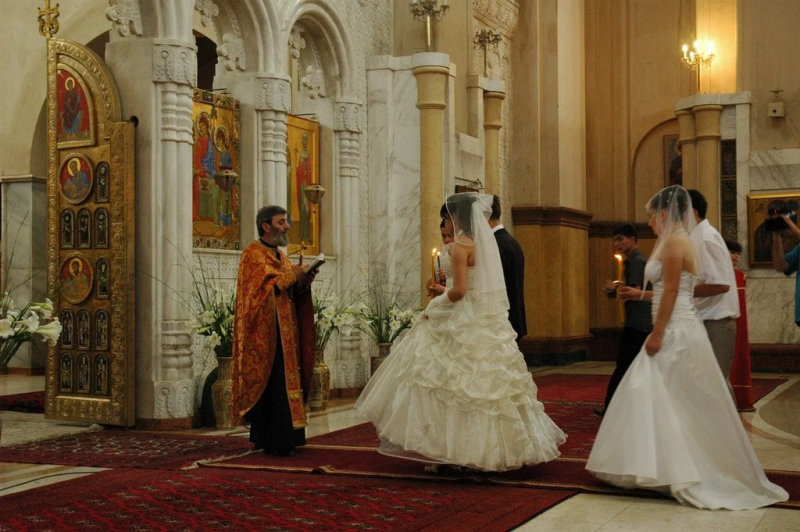
https://theculturetrip.com/ 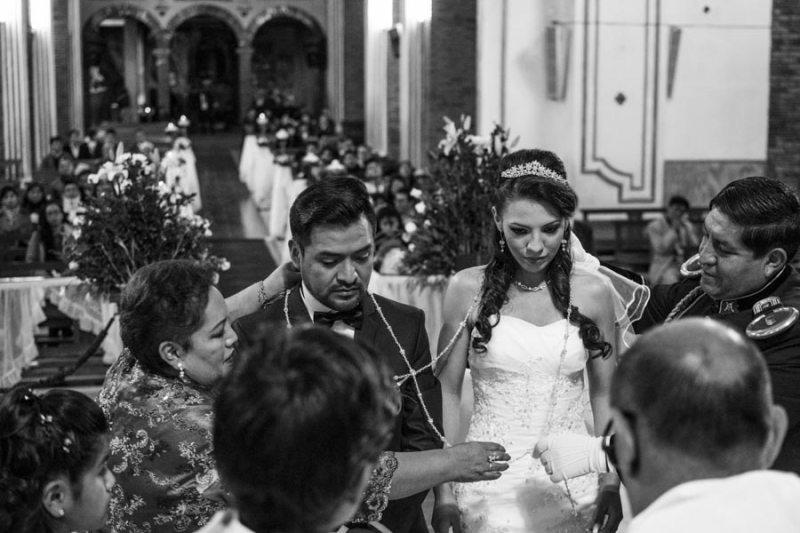
https://theculturetrip.com/ -
Among Bolivian Culture, Customs and Etiquette, dining etiquette is very important. Bolivia and Latin America as a whole strongly adhere to European culture when it comes to dining manners. Depending on the setting and the people you are with—or how well or how long you have known them—you should dress appropriately when dining. Additionally, whether the occasion is social or professional will rely on those factors. The more time you spend with someone, the more relaxed and open your connection becomes, and the more casual your dining manners become. Basically, dinner manners relax as you become a member of the family. Up to a point
These are some general recommendations for proper dining behavior that apply to both restaurants and private homes. Never hand someone something directly into their hands when they ask you to pass them something, such as salt, oil, or vinegar. Place it on the table next to them. The object will be transferred from person to person until it reaches its intended destination, so if they are not next to you, pass it to the person who is. Some individuals are superstitious and think that if you deliver someone something directly into their hand, it will bring them bad luck. This is not just a matter of dining etiquette. Never stand up or reach across the table to pass something. Never "toss" something at someone.
You should always show both hands visible while dining, typically using one hand for eating and the other for chopping. When your hands are free, keep them on the table rather than on your lap or out of sight, which could be interpreted as a sign of dishonesty. Avoid resting your elbows on a table. It is a disrespectful gesture. This is one of the most crucial components of dinner etiquette because it will have a direct impact on how well you get along with your hosts and if they feel comfortable welcoming you.

http://tropicsgourmet.com/ 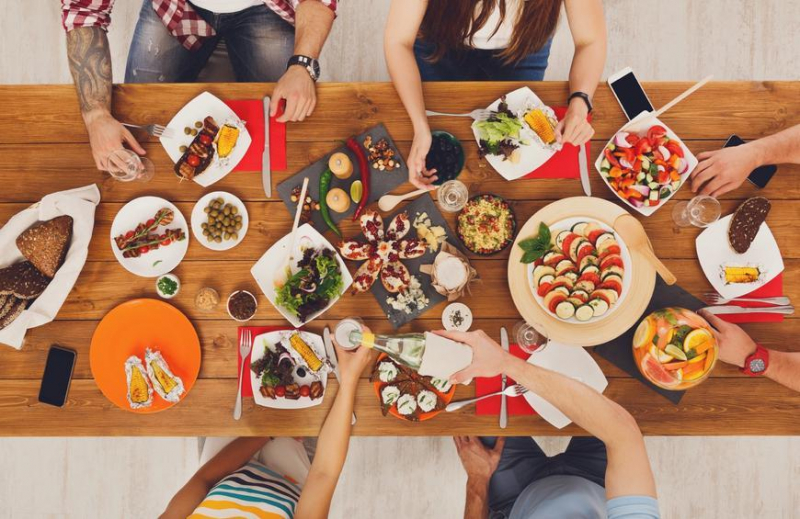
https://www.thedailymeal.com/ -
Religion plays a significant role in Bolivian culture and traditions. Many Bolivian customs, holidays, and festivals are spiritual in origin, typically Catholic. Bolivia has a diverse population, though. In Bolivia, there are close to thirty distinct indigenous cultures, each with its unique set of values and traditions. Many of these tribes continue to worship or show respect to their ancestors' gods.
Catholicism is the predominant religion in Bolivia. More than 80% of Bolivians identify as Catholic. However, when the Spanish arrived to occupy South America in the early 1500s, this was imposed on the indigenous ethnic groups. Priests from the Franciscan, Dominican, and Jesuit orders all made numerous trips to South America to evangelize the local indigenous populations.
Along with Catholicism, other religions including Protestantism and others are growing in popularity in Bolivia. Every major city has a Mormon Church (also known as the Church of Jesus Christ of Latter-day Saints). The largest population of Bahai believers in the world is also found in Bolivia. There are also major churches and several missions belonging to Jehovah's Witnesses, Baptists, Lutherans, and other evangelical groups. Another extremely numerous and fervent group that has colonized significant areas of Bolivia is the Mennonites, the majority of whom reside in southeast Santa Cruz. The small but existent Jewish and Muslim communities in Bolivia, as well as other Asian ethnicities like the Korean and Japanese groups, all practice their respective religions. Religion is also a noticeable thing among Bolivian Culture, Customs and Etiquette that you should know.
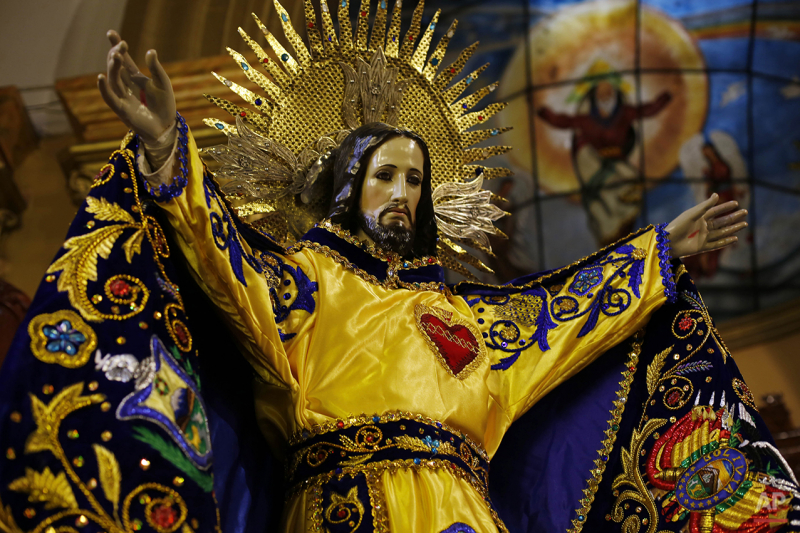
https://apimagesblog.com/ 
https://www.ncronline.org/ -
For thousands of years, animal sacrifices have been a feature of Aymara culture. The tradition lives on today, as seen by the Witches Market in La Paz. The horrific sight of desiccated llama fetuses stacked into baskets, stuffed into boxes, or hanging on display is the main lure for many visitors to the Witches' Market.
Bolivians regard llama fetuses (or sullu in Aymara) to be lucky and will bury one beneath the foundations of a new building to bring protection. It can also be made by brujas (witchcrafters) using incense, sugar, and sweets, as well as wool dyed in a variety of colors, to make a mesa andina (Andean table). When burned, the preparation provides good fortune to a home, business, or other endeavors. In both cases, the llama fetus is used as an offering to Pachamama, or Mother Earth. Humans are rumored to be used instead for larger constructions such as apartment buildings or mines.
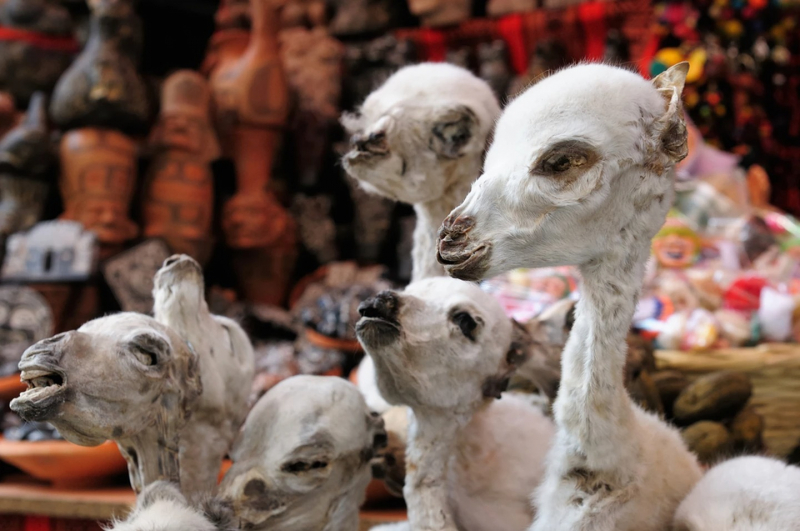
https://theculturetrip.com/ 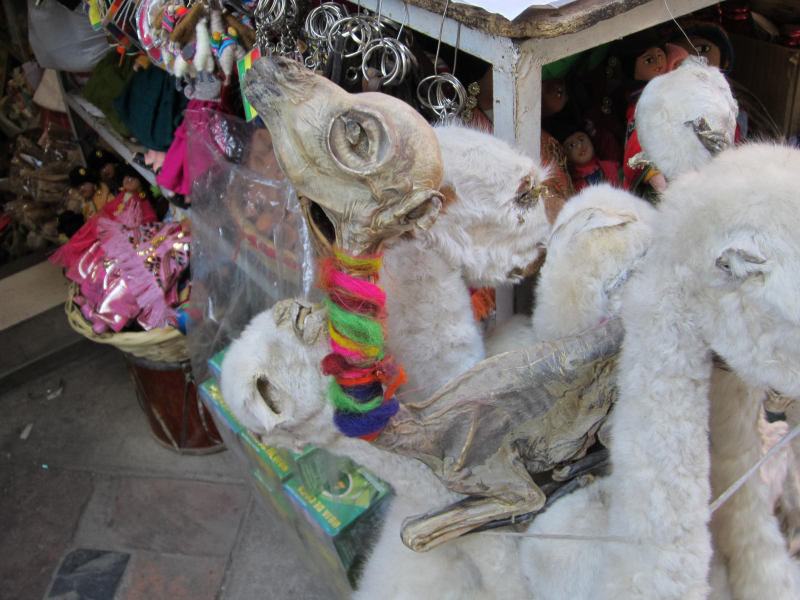
https://bolivianexpress.org/ -
Different places have different traditions and beliefs, and some of them are quite weird. This is known as the "Tinku" culture, which means to "punch your neighbor festival." This is a sacred rite of the Quechua Indians and takes place in Macha, Bolivia, in the Andes. Villagers, both men, and women, punch one other in order to spill as much blood as possible in order to worship the goddess Pachamama and have her bless their harvests. People also believe that if they do not bleed blood, the goddess Pachamama will be dissatisfied. Pachamama is an Andean fertility goddess who is worshiped.
Kicking is prohibited during combat, and no villagers are permitted to wear jewelry. The bouts are brief and brutal, with the villagers aiming for one other's heads. Although local officials and the Catholic Church have attempted to put an end to this bizarre practice, the villagers continue to congregate every year to punch each other.
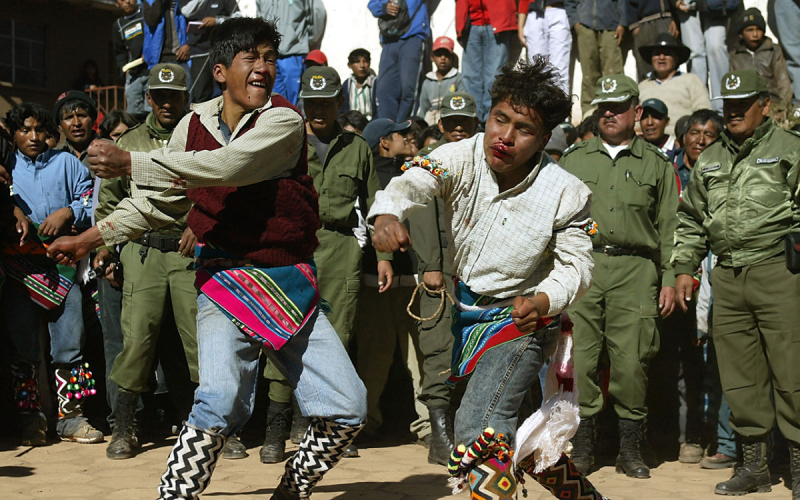
https://vault.si.com/ 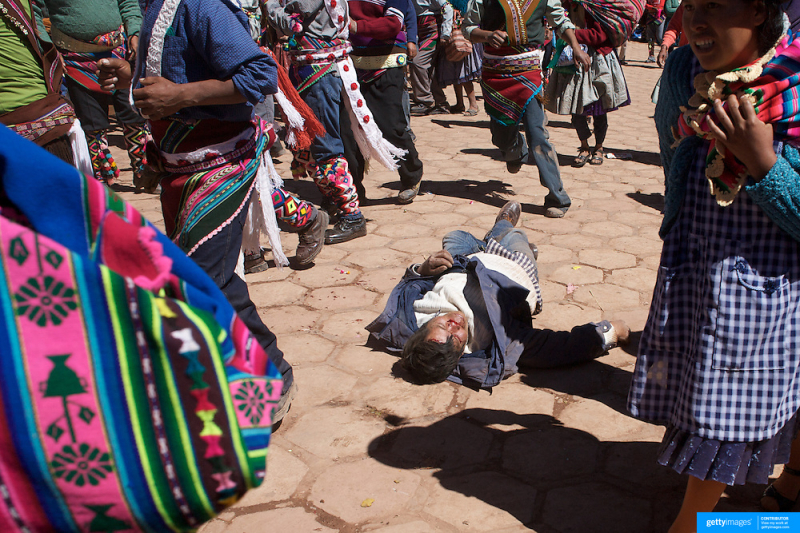
https://timclayton.photoshelter.com/




























